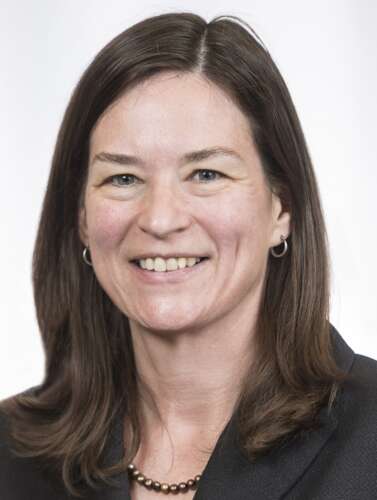When Prof. Jordan Gross of the University of Montana discovered a Fulbright Scholar award tailored to her area of research – Indigenous public policy and criminal justice – she knew she was the person for the visiting research chair position at the University of Guelph.
“When you see an award and an institution looking for someone who does exactly what you do – that’s exciting,” Gross said. “How could I not apply?”
Under the Fulbright Canada program, Canadian and American scholars participate in cross-border academic exchanges including research and lectures.
As a scholar who critiques federal statutory laws in her home country, Gross is using her Fulbright to learn about how federal laws and treaties in Canada tolerate or encourage Indigenous sovereignty expressions of justice through U of G’s College of Social and Applied Human Sciences.
“That’s where the comparative piece is so interesting to me,” she said. “What does that federal shell look like and what can the U.S. and Canada learn from each other?”
The intersection of Indigenous criminal justice and colonial legal structures

American researchers variously study what is called federal Indian law and criminal law, but Gross said only a handful look at intersections with criminal procedure. “It’s like a specialty within a specialty.”
At times, the American government has respected and supported tribal sovereignty; at other times, it has engaged in genocidal efforts to eliminate Indigenous communities, she said. This has led to a “complex patchwork” of criminal justice law and policy, Gross said.
She said much of the law deals with bad public policy, and those decisions continue to have devastating impacts, particularly on Indigenous people in both Canada and the U.S.
The language in her field of study can be problematic, Gross noted. The anachronistic term “Indian” with its racist origins has a specific meaning in both Canadian and U.S. law. In the U.S., Indigenous communities whose autonomy is federally recognized are called “Tribes” or “Tribal Nations” and the land under their control is called “Indian country.”
Among the nearly 575 federally recognized tribes in the U.S., some operate independent tribal courts regulated by Congress. The system is nuanced by complexities such as non-Indigenous people committing offences in Indigenous communities.
Gross said Congress over-regulates tribal courts, forcing them to adopt Westernized methods of justice. In some cases, this can mean undermining a tribe’s ability to hold non-Indigenous people accountable for wrongdoing in Indian country.
That’s why she “unabashedly” favours sovereignty for Indigenous nations. Restoring Indigenous people as the primary arbiters of justice in their own communities will make space for Indigenous justice norms in settler colonial criminal systems, Gross said.
“The more autonomy tribes have, the safer those communities will be.”
Truth and reconciliation in Canada a model for the U.S.
Canada and the U.S., and other settler colonial countries including Australia and Mexico, have different judicial structures and processes but many of the same problems with respect to protecting Indigenous people and communities, Gross said.
In Canada, she is impressed with the federal truth and reconciliation process.
“Canada has had a huge head start in grappling with these issues,” she said, referring to educational initiatives like the Fulbright Scholar program. Although some American states are engaged in truth and reconciliation work, “what we don’t have yet in the U.S. is a national dialogue,” she said — something Canada could serve as a model for.
The Blewett School of Law, where Gross is a professor, is the only law school in Montana. The state contains 12 federally recognized tribal nations; Indigenous people comprise seven per cent of the state’s population and more than 25 per cent of its incarcerated population. “That’s why these issues are so important,” she said, explaining her interest in public safety and specifically the missing and murdered Indigenous persons crisis plaguing much of Montana’s “Indian country.”
Said Gross, “Much of criminal law is just dealing with the downstream consequences of bad public policy.”
The over-incarceration of Indigenous people in both countries — particularly for women who comprise half of the women’s prison population in Canada but represent only five per cent of the national population — starts with flawed social policies that leave communities with inadequate access to education, health care, affordable quality child care and other social services, she said.
If the goal is to seriously confront the problems, then it becomes a political question, she said.
“We’re just dealing in the criminal justice system with the failures of social policies, because by the time someone is an adult in the criminal justice system, there have been so many failures that the criminal law is just doing the cleanup, if you will, and not even doing that very well.”
‘It is not enough to just know the law, you have to know the history that informs it’
Gross has always told her students: “It is not enough to just know the law, you have to know the history that informs it.”
The criminal justice system, she said, is often characterized as “broken.” But if the goal is to reach economic and social inequality for poor and racialized communities, the system is operating successfully, she added. “I do firmly believe we can make the system better.”
Indigenous public policy and criminal justice is “uncomfortable and complicated,” Gross said. There are injustices and privileges to unpack and tough questions to reflect on, and solutions require the hard work of many voices working together. “Hopefully we can encourage students not to fear the complexity or the discomfort,” she said, highlighting conversations that result in laws and policies that respect the dignity of the people and communities impacted by them.
The more professors and educators can be encouraged and supported to pursue this work, Gross said, the more change is possible.
By funding a Fulbright Scholar position, she said, U of G is showing a commitment to highlighting these issues and subjecting them to serious scholarly analysis. “It deepens one’s understanding of their own system to learn about another.”
